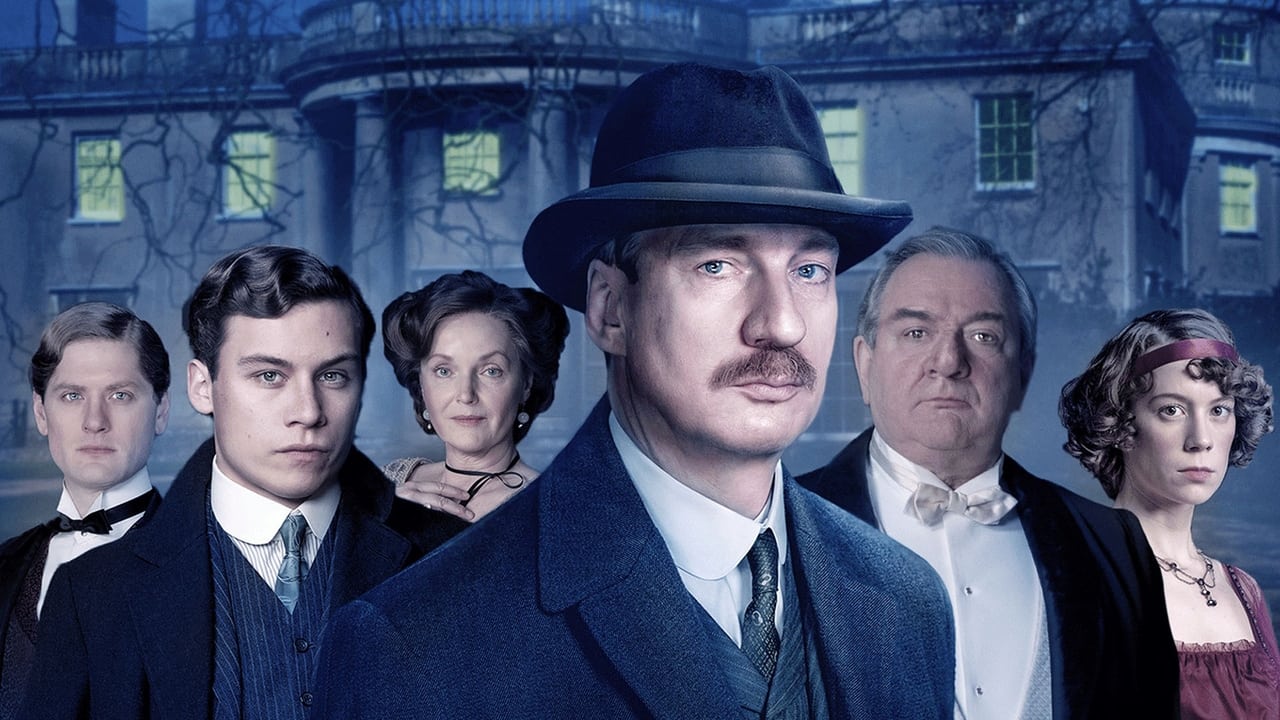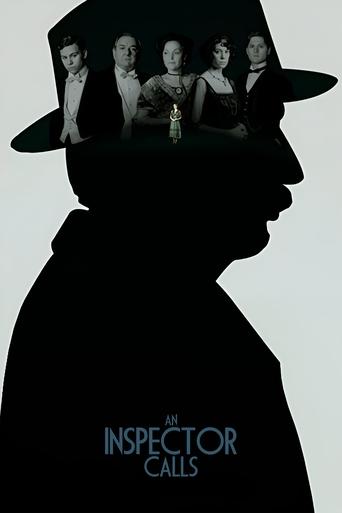EBJ
'AN INSPECTOR CALLS' - 2015Directed by Aisling Walsh{Maudie; Song for a Raggy Boy}Starring David Thewslis{Harry Potter and the Prisoner of Azkaban; The Boy in the Striped Pyjamas}, Ken Stott{The Hobbit: An Unexpected Journey; Cafe Society} and Chloe Pirrie{Shell; Youth}Plot Overview: After a young girl commits suicide, Inspector Goole(David Thewlis) pays the Birling family a visit. Armed with an in depth knowledge about the events and a calm demeanour, Goole interrogates the household, trying to get to the bottom of the night's events.It would probably be useful to say my thoughts on the play before I divulge my opinion of this film. My opinion of the play is that it's a perfectly passable metaphor for Socialism VS Capitalism, contains some good characters and lines but ultimately falters due to its 'Scooby-Doo' plot structure. Now my thoughts on the film. It is a perfectly passable metaphor for Socialism VS Capitalism, contains some good characters and lines but ultimately falters due to its 'Scooby Doo' plot structure.So what is good about it? David Thewlis is probably the film's greatest strength. I admire the man as an actor in pretty much every role he plays. He has a certain gravitas to him and certain demeanour which makes him both intimidating and likable at the same time. Inspector Goole was the only character I liked in the play, and that statement carries over to this film. Another performance that was semi-decent in the movie was Ken Stott as Birling. He was pretty much exactly what I expected and Stott did a decent job at portraying the real remorseless nature of Birling. Despite this, I don't think he stole the role. I could name a couple actors that I think could have done a much better job in the role, like Brian Cox for example. But Stott didn't do a bad job. It wasn't 'good' but it was at least passable.Another major praise I can award the film is the amazing atmosphere they create, mostly down the the fantastic music. Dominik Scherer's fantastic score constantly builds up an eerie atmosphere that PERFECTLY falls in line with the plot of the movie. If anything, I'd argue that the music is the driving force of the movie. Without such a good score, the movie would be just a dull and monotonous experience. But the excellent score makes it a dull and monotonous experience with great atmosphere. The final praise I can give the film is the cinematography. The story may be dumb and the overall package may be extremely boring, but it definitely looks nice. The editing is also pretty concise and at least decent. The lighting is excellent and, as well as the music, helps to manufacture a chilling atmosphere. As for issues, I can certainly name a couple. Any and all performances that do not stem from Thewlis or Stott are very poor. I didn't believe a single word most the remainder of the cast uttered and I really couldn't have cared less about any of them. That leads into a separate flaw: the fact that I couldn't care any less about the characters. Not to say the characters are not good characters. They are certainly interesting. But by the time the movie is over, I didn't care of sympathise with any of them. You could argue that's the point but I disagree. I should like and care for certain characters in the movie, Eva Smith for example, but I just don't. None of them deserve sympathy or empathy, which is a little strange because that begs the question: what is the point of it all? What do we the audience get out of the movie if our care for anyone on screen is at point 0? I mean all the characters have depth and are well written but I didn't even really root for the Inspector. What's the point in it all? I should CONNECT and sympathise with the characters on screen but I just don't. I couldn't care less about them. And that really damages the overall experience. Then there is an issue that is technically out of the filmmaker's hands: I have no interest in the story. This probably relates back to the previous complaint by the fact that we are supposed to be invested in these characters but I just wasn't. I understand the importance of certain themes and how they were effective at the time of release, but by today? I don't think they matter that much. The system of class is pretty much nonexistent. Women are much more fairly treated. There isn't really a distinctive war raging on between generations. Therefore, the movie feels pointless as a whole. And don't even get me started on that ending. I liked the play's ending for it's eerie ambiguity but this makes it 10x more confusing and idiotic. It adds 50 theories into a blender, spits in it and then adds the remains of J.B Priestley before pressing blend and watching all your hard work spray about, because you forgot to put a lid on it.As a whole, I didn't like this movie. David Thewlis was excellent and it has a fantastic atmosphere, but the story and characters are distinctly lacking. It's not a good movie in my opinion, but it's not entirely bad. The praise I awarded just about balances out the negatives, but only just about. As a whole, I don't think this film is worth seeing. It's not that good. I'll rate 2015's 'An Inspector Calls' 5 'Long Stares' out of 10!
ivalenzuelafizedeanu
Based on Priestley's work, an Inspector Calls (AIC) has been brought to video quite a few times, and most recently, this year on BBC1. I have to say, I was slightly disappointed. Many people think Priestley made a social critique, and he did, but in this version of AIC, I saw less critique and more drama. I'm not going to deny, it was a cinematic masterpiece, with many amazing shots and beautiful music (I'll get back to that later). But it completely missed the point Priestley was trying to make. In this play, a rich, British family (representing capitalist mentality) sit down and try to enjoy a nice dinner, celebrating an engagement, when the Inspector arrives (representing the socialist way of thinking) and tells them a girl (Eva Smith) committed suicide because of them. Now, he doesn't pinpoint one person in particular and say like "You! You killed her, it was all your fault! Have fun in jail!". No, instead he guilted them individually one by one and made them, well only Eric and Sheila to be honest, feel bad about what they did. Mr and Mrs B are seen to be the capitalists (and Gerald too). They "ruined" Eva purely out of spite and power. The entire play is a power struggle. The other family members had a somewhat legitimate reason for doing what they did. Anyway, back to the point. By the end of the play, Eric and Sheila (The Birling's children) see themselves as horrible people for doing what they did and they're filled with guilt and remorse. They see their parents (and Gerald) as horrible capitalist people who care more about their image than someone else's life. The Inspector then proceeds to lecture them about how "there are millions of Eva and John Smith's in the world, and if they don't learn, they'll be taught in fire, and blood, and anguish." He then leaves and decides to TIME TRAVEL because you know, he's The Inspector, he can do whatever he wants. This part in particular actually annoyed me. Priestley may have suggested that The Inspector might not be entirely human, but the director didn't do a very good job with this. I mean, to have him time travel is one thing, we see it all the time in other good shows, like Doctor Who, but to have him actually disappear at the end, that's another thing entirely. Was he a ghost? Who knows. Is he not human? Probably. But all that put aside, it was actually quite entertaining even though it lacked similarity to the original play. I'm sure the script was pretty much identical, but still. It lacked a moral. Also the hinted romance between Eva and The Inspector was completely unnecessary, I can't have been the only one who picked it up. The camera angles were glorious, portraying power, control, lack of control sometimes, snobbiness and just about every adjective you can imagine. The music was spooky, but not eerie enough to distract you from the script. Also, there is one particular shot that is perfect in every sense. Eric is sat down, back to the audience (or camera), the two women are sat down by his right, and his father and brother-in-law are stood to his left. The Inspector is standing at the other end of the table, if I'm not mistaken. This shows a perfect social critique and understanding of the play. The woman are aside, trying to not get involved, whereas the men, especially Mr B are distressed and ready to take action. Perfectly done, I think. It portrays the characters perfectly. Mr B is trying to seize the floor, fists clenched on the table, leaning forward with his head down. Gerald is looking away, visibly uncomfortable and trying to get uninvolved. Mrs B is sat there, head high, proud as a queen, whereas Sheila has her head down and looks absolutely ashamed of herself. On the whole, I'm not sure I liked it. It was entertaining, but I'm not sure I learned anything from it other than not to fire people who smile at you.

